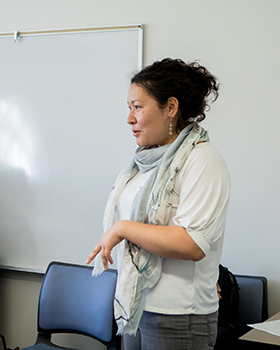The video (above) by Botagoz Sharipova, Nataliya Chemayeva, and other Rotary Scholars in the Water Cooperation and Diplomacy program has been selected as finalist by the Geneva Water Hub and will be featured at the Budapest Water Summit 15-17 October and during Geneva Peace Week 4-8 November.
By Botagoz Sharipova, Rotary Scholar, Water Cooperation and Diplomacy Program
Every living being and every local economy depends on water. In my country Kazakhstan, the source of our water comes from seven major rivers that we share with our neighbors. Six of those originate in other countries including Kyrgyzstan, Uzbekistan, China, and Russia. In Central Asia, access to water and conflict resolution are closely intertwined.
About a year ago, I was fortunate to be one of seven water professionals selected by Rotary District 5340 for a Rotary Foundation global grant scholarship to take part in the Water Cooperation and Diplomacy Program, a collaboration between the IHE Delft Institute for Water Education in The Netherlands, the University for Peace in Costa Rica, and Oregon State University in Oregon, USA.
The situation in the Aral Sea basin is very unique. Former water management policies have left the Aral Sea, once the fourth largest lake in the world, a fraction of its size and contaminated by high salinity. It has lost 90 percent of its area in just 30 years, with dramatic consequences for health, local economies, and the environment. Water shortages exacerbate tensions.

Botagoz Sharipova speaks about post-graduation plans at a Meet the Scholars event 24 September at Oregon State University. Photo by Celeste Noche. © Rotary International. All Rights Reserved.
The situation has affected relationships between the Central Asia countries and between water experts in the region. There is disagreement on the amount and timing of water coming from upstream Kyrgyzstan and Tajikistan to downstream Uzbekistan, Kazakhstan and Turkmenistan. Upstream countries want to boost their economy by producing cheap electricity, building dams. Downstream countries heavily oppose that because their agriculture needs water in summer time. Water policies by one country can drastically impact others. That is why cooperation between neighboring countries is not a choice, it is a matter of survival.
Through my studies so far, I have learned how other regions of the world are coping with similar problems as my region is facing. In realizing how many years it took those regions to cooperate, I am more optimistic about my own Aral Sea basin. My optimism has also increased working with the other scholars in this program, water practitioners already working in the sector, learning together not only about water but about cooperating while studying. I believe that collectively we will be able to change our water resource management for the better.
I am more resolute than ever that practices of the past should be left behind. Studying Water Cooperation and Diplomacy has helped me realize that when managing water, we should consider each and every impact at all levels and include all stakeholders for consultations and decision-making.
What I love about working in water resource managing is that you can bring about positive changes in the world. You do not become rich working in the water field in Central Asia. But I am happy knowing that I am contributing to the peace and well-being of the people in my region. And I am thankful to Rotary for advancing my understanding of the connections between water security and peace.
https://blog.rotary.org/2019/10/10/water-and-peace-in-the-aral-sea-basin/
